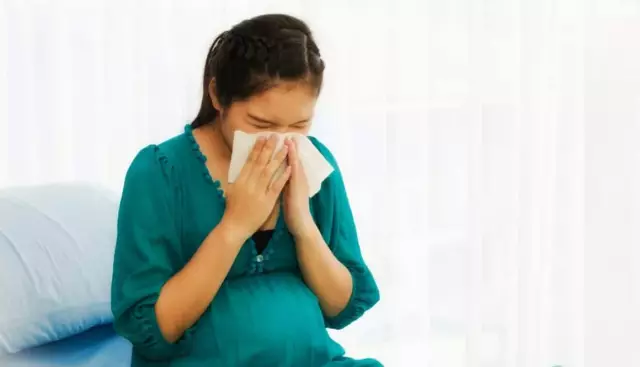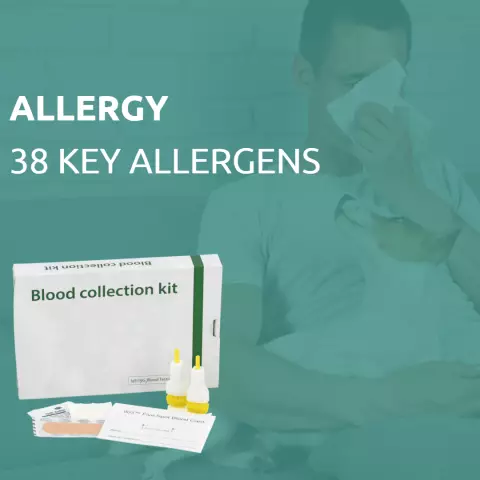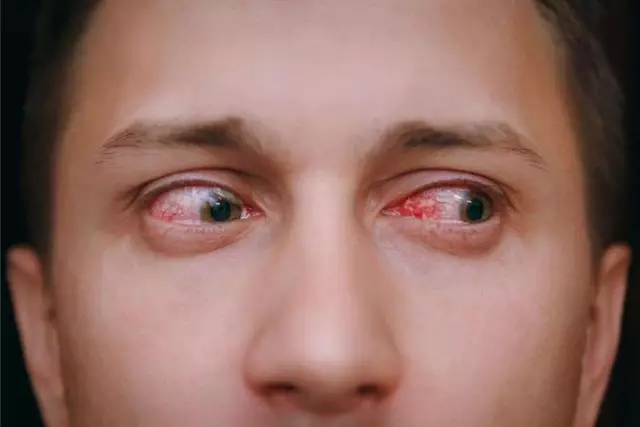- Author Rachel Wainwright wainwright@abchealthonline.com.
- Public 2023-12-15 07:39.
- Last modified 2025-11-02 20:14.
Allergy
General characteristics of the disease

Allergy is the body's overreaction to the effects of certain external factors and irritants, which it perceives as potentially dangerous.
The immune response to any antigens that invade the body is very complex and includes the production of antibodies, which are a kind of defenders of the body. However, there are situations when the immune system "loses control" and begins to perceive a completely harmless antigen as dangerous. It is at such moments that a destructive hyperreaction is triggered, which manifests itself in the form of an allergy.
Immunity is endowed with a wonderful memory, therefore, if the first contact of the body with a foreign substance has occurred, and the mechanism for the production of antibodies to neutralize antigens has been triggered, then this process (allergy) will be repeated with each new encounter with this antigen (allergen).
You can find out about folk remedies for treating allergies at shopnebolel.ru.
Allergy Causes
Almost any substance can potentially cause allergies, as well as certain physical factors, such as low air temperatures or exposure to sunlight.
Irritants that provoke allergies, depending on the origin, are divided into several groups:
- food;
- pollen;
- household;
- medicinal;
- epidermal (allergy to the external components of animals: wool, dandruff, claws, feathers, etc.);
- fungal and bacterial;
- chemical;
- other allergens.
All of the above substances become allergens only if there is a malfunction in the immune system, otherwise they do not cause allergies.
There are several main risk factors for allergies:
- Genetic predisposition. Researchers' estimates indicate that if one of the parents has an overreaction, then the child will have a 30% chance of allergy. This data is doubled if both parents are allergic.
- Smoking. For people predisposed to allergies, tobacco smoke is an activator of triggering hyperreactions, and not only smokers suffer from this, but also people who inhale this smoke.
- Upper airway problems. A variety of respiratory tract infections and colds are allergy-provoking factors, which is explained by the fact that viruses, damaging the mucous membrane, facilitate the penetration of allergens into the body.
Allergy symptoms
This disease can take several forms:
- Allergy of the respiratory tract: signs of colds are characteristic: clear discharge from the nose, repeated and frequent sneezing, but they appear much longer;
- respiratory allergy: manifests itself in the form of allergic rhinitis and bronchial asthma;
- conjunctivitis: allergy symptoms in this case are expressed by tearing and burning in the eyes;
- enteropathy: in this form, symptoms of allergy to drugs and food products appear: vomiting, diarrhea, nausea, intestinal colic, constipation, swelling of the tongue and lips;
- anaphylactic shock: this form of allergy is the most dangerous and can appear in the interval from a few seconds to several hours (usually five) from the moment the allergen enters the body. Anaphylactic shock can be caused by an allergy to drugs or animal bites, which is expressed as follows: loss of consciousness, seizures, severe shortness of breath, vomiting, rash on the body, uncontrolled urination and defecation. If you experience such allergy symptoms, you should immediately call an ambulance.
Skin allergy manifestation
This type of allergy indicates that an allergen has got into the mucous membrane or into the bloodstream and manifests itself in the form of redness and itching. Allergy to the skin is most pronounced in those areas to which either clothing is tight or there are a large number of skin folds.
Skin allergies can be a consequence of food allergies, as the body's reaction to a variety of foods, of which the most potentially dangerous are honey, whole milk, nuts, citrus fruits.
Not only food allergies, but also other types of this disease can cause manifestations on the skin, for example, pollen, animal hair, dust, household chemicals, medicines and some types of fabrics can also become allergens.
Allergy on the skin differs from ordinary rashes in that without the elimination of the allergen, the rashes cannot be treated.
Allergy in a child

Allergy symptoms in a child are similar to allergy symptoms in adults:
1.redness;
2. rash on the body, buttocks, cheeks;
3. peeling and irritation of the skin of the cheeks (diathesis);
4. excessive sweating even in cases of mild overheating;
5. constant diaper rash;
6. urticaria;
7. peeling on the scalp and eyebrows;
8. various manifestations of digestive disorders;
9. Quincke's edema (sudden swelling of the mucous membranes, skin, subcutaneous tissue);
10. wheezing.
There are several ways to identify allergens in a child:
- Careful observation of parents when and under what conditions the child's allergy symptoms intensify; in particular, it is recommended to keep a food diary and make entries in it regarding the child's body reaction to various foods;
- Specific tests, in particular, a blood test for immunoglobulin E;
- Scarification tests, which allow to identify a substance that causes an allergy in a child, starting from the age of five: a minimum amount of an allergen is applied to the skin of the forearm, and the body's reaction to it is observed.
The manifestation of allergies in a child should be distinguished from pseudoallergic reactions, which most often indicate disorders in the state of the digestive tract.
Allergy treatment
Complete elimination and treatment of allergies should include general improvement of the body and strengthening of immunity, and effective treatment of allergies implies avoiding contact with allergens.
The medicines that conventional medicine recommends for allergy treatment include the following:
- anti-inflammatory drugs;
- antihistamines;
- corticosteroids;
- antileukotrienes;
- steroid drugs for external use;
- mast cell stabilizers;
- bronchodilator drugs;
- immunomodulators.
YouTube video related to the article:
The information is generalized and provided for informational purposes only. At the first sign of illness, see your doctor. Self-medication is hazardous to health!






